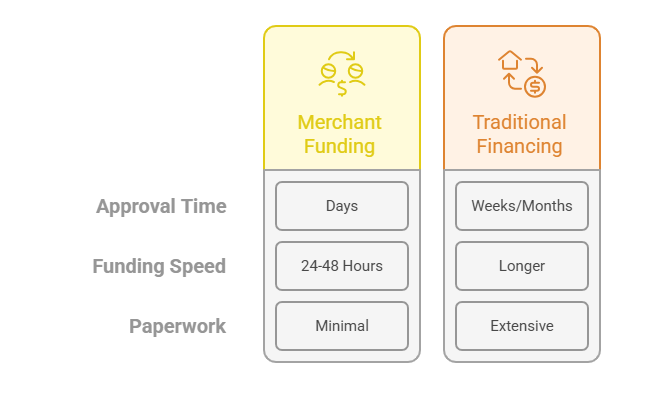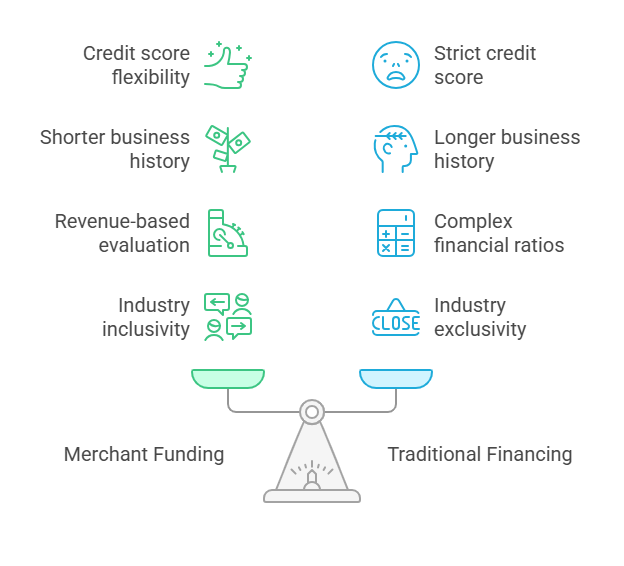When it comes to business financing, merchant funding has emerged as a compelling alternative to traditional financing options. The top 6 advantages of merchant funding vs loans might surprise business owners who've struggled with lengthy approval processes and rigid payment structures. Unlike conventional financing, merchant funding offers a different approach that could better align with your business's unique cash flow patterns and operational needs.
Understanding these advantages can help you make more informed decisions about your business's financial future. From speed and flexibility to qualification requirements, merchant funding presents several benefits that traditional financing often can't match.
Speed and Quick Access to Capital
Speed and quick access to capital represents one of the most significant advantages when comparing merchant funding options to traditional financing. Merchant advances typically offer much faster approval processes than conventional financing methods.

- Rapid approval times: Many merchant funding providers can approve applications within days rather than weeks or months. This speed comes from streamlined underwriting processes that focus on sales performance rather than extensive documentation reviews.
- Same-day funding possibilities: Once approved, funds may become available within 24 to 48 hours in many cases. This quick turnaround can be crucial for businesses facing immediate operational needs or time-sensitive opportunities.
- Minimal paperwork requirements: The application process typically requires fewer documents compared to traditional financing. Most providers focus on recent sales data and bank statements rather than extensive financial histories and projections.
Flexible Repayment Based on Sales Performance
Flexible repayment based on sales performance stands out as a key differentiator between merchant funding and traditional financing options. This sales-based approach can provide significant relief during slower business periods.
- Automatic adjustment to cash flow: Repayments fluctuate with your daily sales volume, meaning you pay less during slow periods and more during busy times. This natural adjustment helps maintain healthier cash flow throughout various business cycles.
- No fixed monthly payments: Unlike traditional financing with rigid monthly installments, merchant funding adapts to your business rhythm. This flexibility can reduce financial stress and help prevent cash flow crunches that might occur with fixed payment schedules.
- Percentage-based collections: Repayments are typically collected as a small percentage of daily credit card sales, making the process seamless and automatic. This approach eliminates the need to remember payment dates or worry about missing installments.
No Collateral Requirements for Qualification
No collateral requirements for qualification make merchant funding accessible to businesses that might struggle with traditional secured financing. This advantage opens doors for many business owners who lack significant assets to pledge.
- Personal assets remain protected: Business owners don't need to risk their homes, equipment, or other valuable assets to secure funding. This protection can provide peace of mind and reduce the personal financial risk associated with business financing.
- Faster qualification process: Without the need for asset appraisals and collateral evaluations, the qualification process moves much more quickly. Providers can focus on sales performance and cash flow rather than conducting lengthy asset assessments.
- Better access for newer businesses: Startups and newer businesses that haven't accumulated significant assets may find merchant funding more attractive. The focus on sales performance rather than asset value can level the playing field for growing companies.
Easier Qualification Standards and Requirements
Easier qualification standards and requirements represent another significant advantage of merchant funding compared to traditional financing options. These relaxed standards can make funding accessible to a broader range of businesses.

- Credit score flexibility: Many merchant funding providers focus more on business performance than personal credit scores. While credit history may still be considered, it's often not the primary determining factor for approval.
- Shorter business history requirements: Some providers may work with businesses that have been operating for just a few months, whereas traditional financing often requires years of established operation and financial records.
- Revenue-based evaluation: The primary qualification criterion typically revolves around consistent sales volume rather than complex financial ratios or extensive business plans that traditional financing often requires.
- Industry inclusivity: Certain industries that traditional financing might consider high-risk, such as restaurants or retail businesses, may find more acceptance with merchant funding providers who understand seasonal fluctuations and industry-specific challenges.
Cash Flow Management Benefits
Cash flow management benefits make merchant funding particularly attractive for businesses with variable income streams. These advantages can help maintain operational stability throughout different business cycles.
- Seasonal business support: Businesses that experience seasonal fluctuations can benefit from the sales-based repayment structure, paying more during peak seasons and less during slower periods without penalty or default risk.
- Working capital preservation: Since repayments adjust automatically to sales volume, businesses can better preserve working capital during challenging periods, maintaining inventory levels and operational capacity without strain.
- Predictable cash flow planning: Knowing that repayments will align with sales performance allows for more accurate cash flow forecasting and business planning, reducing financial uncertainty in daily operations.
- Emergency fund accessibility: Quick access to capital can serve as an emergency financial resource for unexpected expenses, equipment failures, or sudden opportunities that require immediate action.
Key Considerations When Choosing Merchant Funding
Key considerations when choosing merchant funding can help businesses make informed decisions about this financing option. Understanding these factors ensures that merchant funding aligns with your specific business needs and circumstances.
- Cost comparison analysis: While merchant funding offers convenience and speed, it typically comes with higher costs than traditional financing. Businesses should carefully evaluate the total cost against the benefits of quick access and flexibility.
- Sales volume consistency: Merchant funding works best for businesses with steady credit card sales volume. Companies with irregular sales patterns or those that primarily deal in cash may find this option less suitable.
- Future financing needs: Consider how choosing merchant funding might affect future financing options and business credit profile, as well as whether the funding amount will meet your projected business growth requirements.
- Repayment timeline planning: Understand the expected repayment period based on your average sales volume and plan accordingly for how this will impact your business operations and cash flow management strategies.
The top 6 advantages of merchant funding vs loans demonstrate why this financing option has gained popularity among business owners seeking flexible, accessible capital solutions. From rapid approval processes and sales-based repayments to relaxed qualification standards, merchant funding addresses many pain points associated with traditional financing.
However, it's important to carefully evaluate whether merchant funding aligns with your business model and financial goals. The higher costs associated with this convenience and flexibility should be weighed against the benefits of quick access to capital and adaptive repayment structures.
For businesses with consistent credit card sales, immediate capital needs, or challenges qualifying for traditional financing, merchant funding might offer the right combination of speed, flexibility, and accessibility. Take time to assess your specific situation and consider consulting with financial professionals to determine the best funding approach for your business's unique circumstances and growth objectives.

.png)






